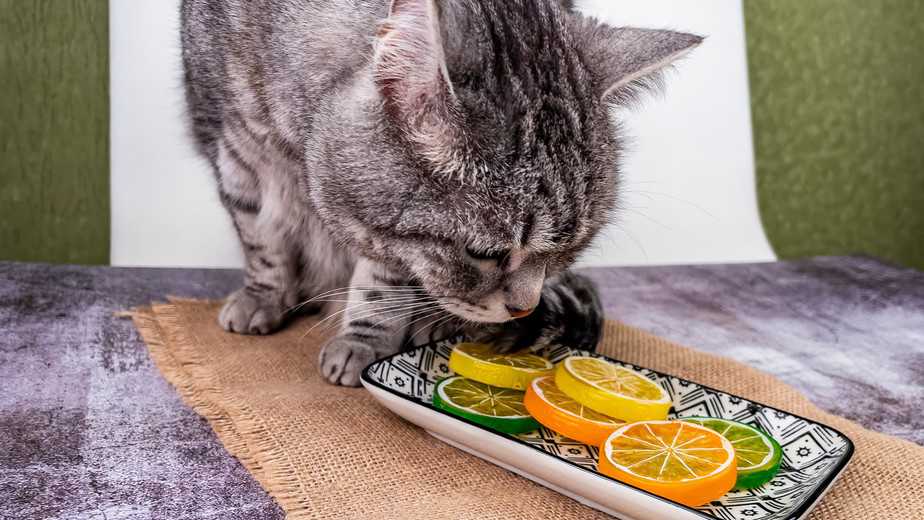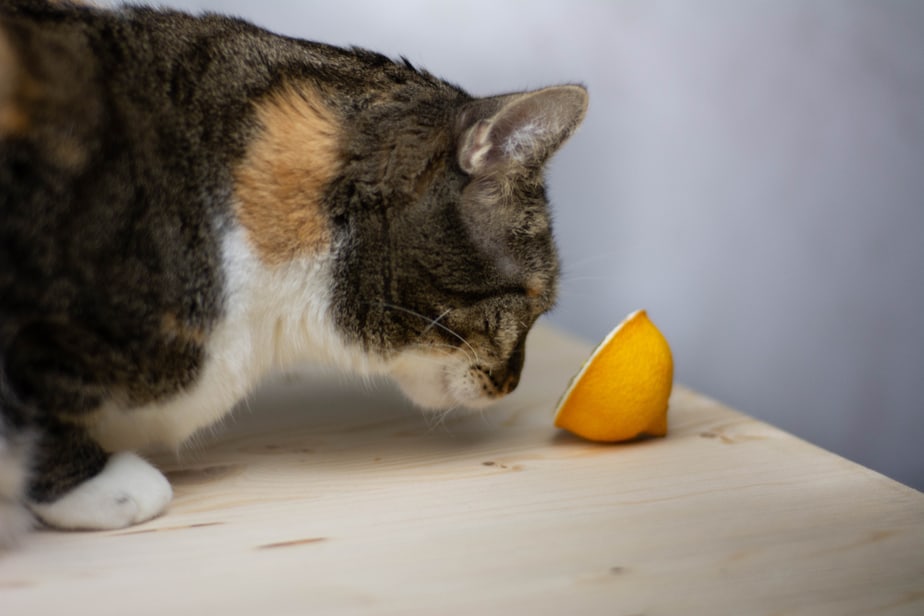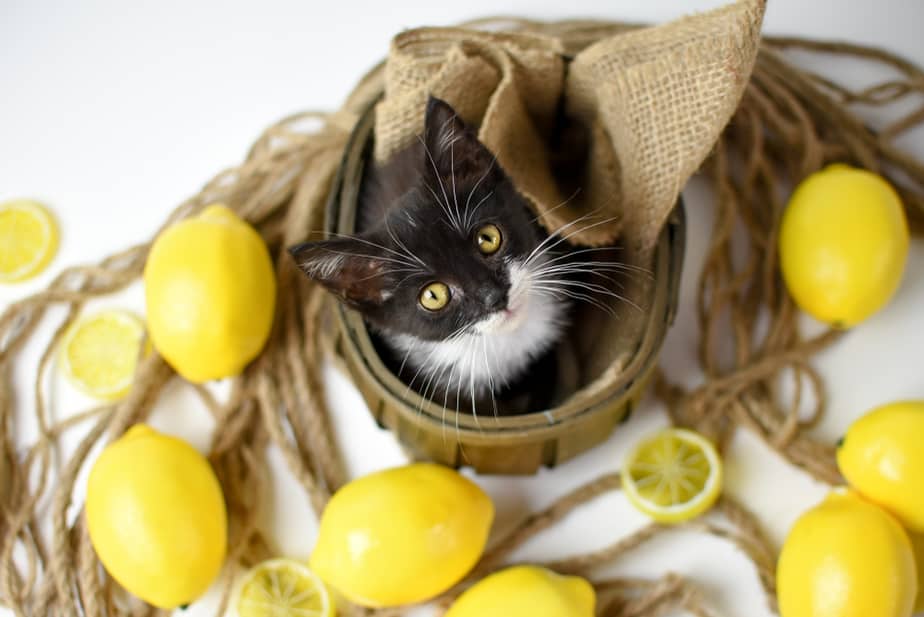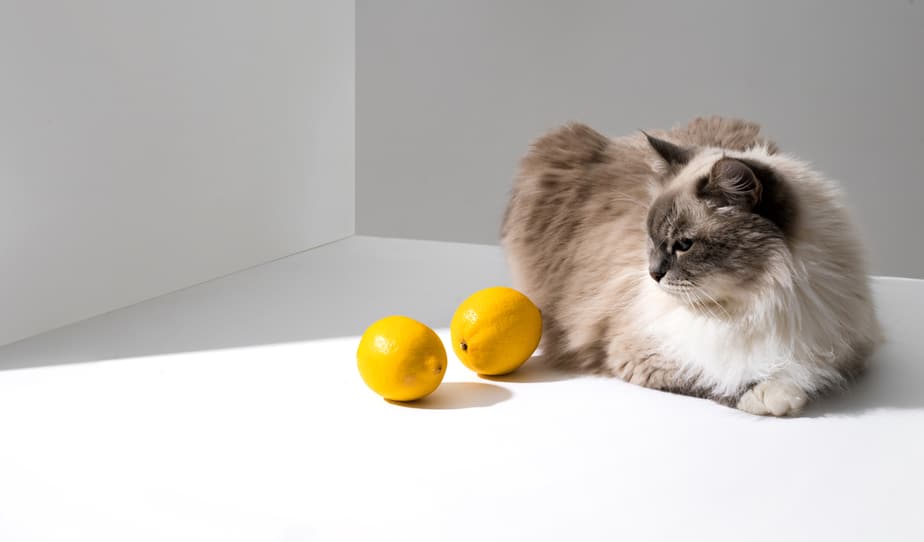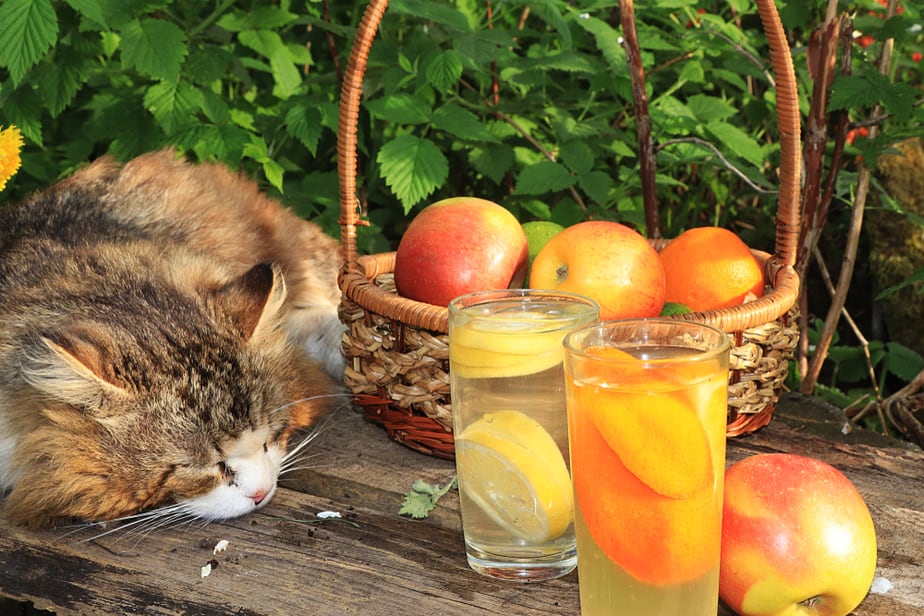📖 Table of Content:
These vibrant-colored fruits take our minds elsewhere at the very first sight. Perhaps to those tropical regions where all you can think about is the sun. But what about our pets? Can cats eat lemon and enjoy that beautiful scenery with us?
Humans are drawn to citrus fruits, especially their unique smell, and many people enjoy them. We’re not sure if we can say the same for our pets.
Do cats even like lemon and are they allowed to eat them? Fruits are known to be highly nutritious for humans, but perhaps some can be included in our cats’ meals as well.
Lemons have a unique zest to them and lemon juice is like no other. This is why some people find it hard to gulp down a glass of lemonade without sugar. This citrus fruit may be too much for some people, and your furkid’s hairs may stand up when she takes a bite.
Can cats eat lemon? Is it harmful to them?
Lemons, unfortunately, are harmful to cats. While nothing is stopping you from peeling some and squeezing them, you should keep your pet out of the way. Mandarin oranges, limes, grapefruits, and other citrus fruits, as well as lemons, are hazardous to cats.
This may be disappointing news if you had planned to share some lemonade with your pet. Don’t worry, these fruits’ health benefits aren’t required for your feline. They provide a lot of nourishment to people, but in this case – sharing (with your kitty) is not caring.
These can be toxic to felines and therefore, she should stay away from them. You shouldn’t worry much about your cat eating lemons, however. They’re naturally repelling to her because of the strong smell.
Are there any health benefits?
Citrus fruits carry a surplus of health benefits. However, most of these benefits don’t serve a great purpose to felines. For example, vitamin C is crucial to humans while cats synthesize it in their liver.
Vitamin C is a health supplement that’s beneficial to a variety of bodily systems as well as the immune system as a whole. It aids in iron absorption as well as collagen formation. This helps your cat’s dental and bone health.
It’s also high in antioxidants, which aid in the battle against free radicals in your cat’s body. Despite all of these health benefits, cats don’t require additional sources of this vitamin. Your super-pet produces this vitamin on her own.
Cats’ livers produce enough vitamin C to keep them healthy, so they don’t need to supplement it with lemons. Humans, unlike our animal friends, rely completely on the consumption of this vitamin through a variety of meals.
Is lemon toxic to cats?
Unfortunately, yes. We know this isn’t what you wanted to hear, but all citrus fruits are poisonous to your pet. So, if you see her fascinated by or playing with some lemons, stay close by and keep an eye on her.
Although it’s improbable that your cat will die from eating a lemon, why take the chance? Essential oils including limonene and linalool, as well as psoralen, are all components that make these fruits hazardous to cats.
These are organic, naturally occurring chemicals that, if consumed by cats, will wreak havoc in their bodies!
Check for any symptoms of toxicity if you come home to a half-eaten lemon. Vomiting, diarrhea, abdominal pain, and drooling are just some of the alarming signs. So, if you see your cat salivating next to a shredded lemon, it’s not because she thinks it’s delicious.
We understand how upsetting it is to get such bad news. As a result, we propose emptying your bowl of these citrus fruits and keeping them out of the reach of your cat’s paws.
This doesn’t mean you shouldn’t eat them since they have plenty health benefits for people. We’re just mortals and need a rich diet to help us grow and develop, unlike cats. It’s known they are a superior species, after all!
Do cats even like lemon?
Hate is a strong word, but it closely describes how cats feel about lemons. They have a different point of view on this citrus fruit than humans. While we love the refreshing smell and use lemons in many ways, felines find them rather repulsive.
We use lemon in foods and as natural air fresheners to give us that bittersweet taste and smell. However, your furry friend will most likely run away from the plants you sprayed with lemon.
Their sense of smell is stronger than ours, so they find lemon to be a bit too much. The zest is a natural cat deterrent and many people use citrus fruits to their advantage.
If you have a stubborn cat that won’t leave your plants alone, or you have neighboring pests that eat up your garden – some lemon spray will do the trick.
Squeeze some lemons and add water and pour that into a spray bottle. This should keep the cats’ noses out of your business. Other natural cat repellents you could make at home are black pepper as well as other citrus fruit.
Other potential risks of cats eating lemon
These fruits contain a lot of sugar in addition to a lot of harmful chemicals. Fruits are generally high in sugar, which is one of the reasons humans enjoy them. Your cat, on the other hand, doesn’t require a lot of carbohydrates because they are an unnecessary part of her diet.
Cats are unable to absorb it since it’s unnecessary in their development, so even healthy sugars like those found in fruits, can be harmful to your pet.
This results in a build-up of carbs, which leads to fat storage. We think a few extra pounds on our furkids makes them more huggable, but we’re sure your fluffy friend will disagree.
Weight gain could put extra strain on her joints leading to potential arthritis development in her later years. Aside from that, felines with excessive cholesterol are in danger of heart disease and stroke.
Besides, citrus can also irritate her skin, causing allergic dermatitis to develop. Some of the signs of this medical condition include sneezing, rashes, wheezing, and a stuffy nose.
Can cats eat lemon cake?
Having established that lemon can be toxic to cats, the answer is no. Cats shouldn’t eat lemon cake or any other cake for that matter.
The ingredients that a cake contains aren’t healthy for your pet baby. Lemon cake includes lemons, sugar, butter, and other compounds that can be harmful to felines.
We know lemons can be detrimental to your pet’s health, but what about sugar and butter? Cats can eat butter if it’s just a lick or two every now and then.
It’s a popular element in many cuisines that’s difficult to avoid. However, butter is another reason you shouldn’t encourage your cat to eat lemon cake.
Also, lemon cake contains certain amounts of sugar that are a big no-no. When it comes to sugar, it’s a carbohydrate that’s unnecessary in felines’ bodies. It can lead to obesity and various other health issues.
What about lemon peels? Are they toxic?
Even though these brightly colored fruits are repelling to cats, it doesn’t stop them from investigating. What’s more refreshing than coming home from a long day of work to squeeze some lemons and make some lemonade?
If your pet’s an inquisitive one, you’ll have to make sure to keep the peels out of her reach. The most harmful portion of a lemon is the peel because of the high concentrations of limonene and linalool, which are the most toxic components of lemons.
While these chemical molecules give lemon its delicious flavor, cats can’t smell anything but rejection. Because cats’ senses are far superior than humans’, it’s unlikely that they’ll be interested in eating lemon peels.
Can cats drink lemon juice and lemonade?
It feels like answering this question is unnecessary at this point, but we’re more than glad to help and explain! The difference between lemon juice and lemonade is water and sugar. Plain lemon juice is just the juice squeezed from these fruits, which is a big no for cats.
Lemonade is lemon juice mixed and stirred with water and some sugar. You’d think that this diluted version of lemon juice is safe for feline consumption, but unfortunately, it’s not. We don’t want to be a wet blanket, but there’s just no way cats can eat lemon.
In conclusion
To answer the question of whether cats can eat lemon, we have provided you with some crucial information on how this citrus fruit affects cats. Lemons, mandarin orange, limes, and grapefruit, are all harmful to your pet.
Because of the essential oils present in these fruits, as well as high amounts of sugar, felines can’t eat any foods with lemon or lemon juice. Lemonade is off the limits too.
We never want to be a killjoy, but your pet’s health is our top priority. If you’re looking to incorporate some fruits into your furkid’s diet, opt for some apples, blackberries, as well as bananas.
Never forget to throw away the lemon peels after making some lemonade. This part of the fruit is the most poisonous due to the high concentration of essential oils. Don’t panic too much, because cats are smart little creatures.
Although curious, they can judge for themselves. It’s unlikely they will decide to eat these on their own, because the strong aroma of lemon is repulsive to them.
Read more: Can Cats Eat Cherries? Safe Or Hazardous?
